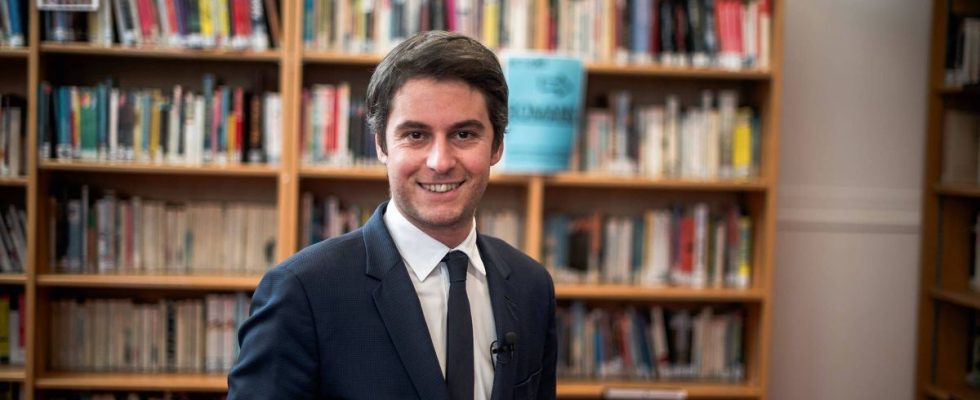Published on
Updated
Reading 4 min.
in collaboration with
Jean-Paul Brighelli (Teacher and author)
In a committed posture, the Minister of National Education Gabriel Attal unveiled yesterday a whole series of measures whose goal is written in black and white: to improve the French educational level. But are its announcements adapted to the current context in which our children are evolving? Doctissimo asked these questions to Jean-Paul Brighelli, teacher and author of critical books on education in France.
Gabriel Attal, Minister of National Education, intends to tackle the educational divide that reigns in our schools, middle schools and high schools and wants to make it known. Tuesday afternoon, at the Charles Péguy college in Paris, he presented a demanding plan aimed at provoking “a shock of knowledge” in his words, from primary school to high school.
Repeating a year becomes compulsory again
The first measure and undoubtedly the strongest – and the one which will provoke the most reaction – intends to facilitate repeating a year at the end of this school year. This would no longer be offered (it is almost never followed) but announced to parents. “The teachers will have the last word. By resolving this debate, I want to fight against forced failure” indicated the minister. In fact, the child could therefore either repeat a year or move to the next class by accepting specific support.
Level groups organized at college
To combat disparities, Gabriel Attal also announces the creation of level groups in French and Mathematics in 6th and 5th initially, then 4th and 3rd subsequently. There should be no more than 15 children per group, and teachers should be trained in differentiated teaching. An announcement that requires significant job creation.
A new class at high school between third and second
Gabriel Attal also intends to further sanction learning at the end of the 3rd year and toughen the Brevet, which would thus become an exam for passing into the second year. In addition, it will be the grades given by the teacher that will apply and no longer an academic correction that allowed the level to be raised. In fact, students who do not obtain this diploma will not be able to obtain their passage to 2de whatever the sector (general, technological or professional). These students will be sent to a “prepa-high school” class which will have to provide a refresher course to enable them to join a second classical course the following year.
More mathematics from primary school
Finally, to compensate for the poor PISA ranking received by France regarding the level of students in mathematics, the minister announces that he wants to introduce concrete notions such as fractions much earlier in the primary school curriculum (in CE1 instead of CM1) and focus classes more on the application of mathematics. Thus, a new applied mathematics exam would take place at the end of 1st year for the general and technological sectors.
Are these measures sufficient to raise the level of students?
What do you think of these measures? Do they really aim to improve the level of our children and can they achieve it? Doctissimo asked these questions to Jean-Paul Brighelli, teacher and author of critical books on education in France, such as The two-speed school, published last August and The idiot’s factory. His point of view as a teacher is not very favorable to these measures, however strong they may be: “It’s excellent communication, really, but in terms of education, Gabriel Attal, a privileged child, and far from the education system, doesn’t know much about it. I don’t see any real project behind it, they are independent proposals which are not connected by anything in my opinion.”
Measures seen as useless
Several decisions are, according to him, open to criticism. In particular that of strengthening the power of teachers over grade repetition: “9 times out of 10 we know, this only pushes the child deeper. Especially since in France, social origin counts a lot in academic success and repetition mainly affects disadvantaged citizens. It’s a double punishment. What would work more is an operation by certification by subject, which would indicate the strengths and weaknesses of the student (for Parcoursup, for employers, etc.) without blocking them.”
Regarding the Brevet, and this new class dedicated to those who fail, the measure does not seem relevant to him either. “The certificate is 10% of students who do not have it. It will be 50% if we no longer use the academic correction. Already, can we assume to tell parents that there will be a 50% failure rate? Furthermore, where do you put these remediation classes? And who should we entrust them to when France is sorely short of teachers today?” he asks.
Others as unsuitable
On the other hand, regarding level groups, our expert has been in favor of it for a long time.the single college does not work” he explains; but here, it is rather the “applicable” side which seems to fail for the essayist: “Level groups require small groups; the greater the difficulties, the fewer students there should be! Which indicates having to have more teachers and more classes. While our colleges are already operating at 120% of their capacity currently… Where are we going to put them?”
Once the announcement has been made, it is difficult to know whether our children will find these new measures the ideal framework for learning better and acquiring more solid foundations. “We sense an intention behind each of these measures, but which is not really educational.” concludes our expert.
